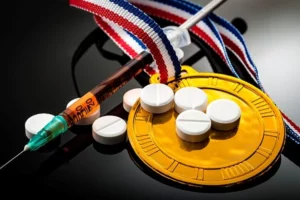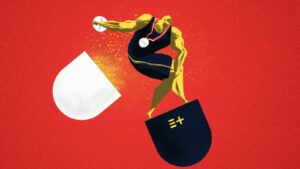In the arena of sports ethics, few topics evoke as much controversy and debate as the issue of doping. For decades, athletes, coaches, and sporting organizations have grappled with questions surrounding fairness, integrity, and the pursuit of excellence. In the midst of this ongoing dialogue, Alexander Hutchison, PhD, offers a provocative perspective in his book “In Defense of Doping: Reassessing the Level Playing Field.” In this article, we delve into Hutchison’s arguments and the implications they hold for our understanding of sports ethics.

Redefining Doping: Hutchison’s central thesis challenges conventional wisdom by proposing a reevaluation of the concept of doping itself. Rather than viewing doping as an unethical means of gaining an unfair advantage, he suggests that it be reframed as a legitimate strategy for enhancing performance within the context of modern sports.
Drawing on insights from philosophy, bioethics, and sports science, Hutchison argues that the current anti-doping paradigm is inherently flawed. He contends that the arbitrary distinction between natural and artificial enhancements fails to acknowledge the myriad ways in which athletes already manipulate their physiology through training, nutrition, and technology.

Leveling the Playing Field: At the heart of Hutchison’s argument lies a critique of the ideal of the “level playing field.” Rather than striving for an unattainable state of absolute fairness, he advocates for a more pragmatic approach that acknowledges the inevitability of inequality in sports.
Hutchison challenges us to reconsider our assumptions about fairness and competition. He argues that the relentless pursuit of an unattainable ideal has led to a culture of hypocrisy and moralism within the world of sports. By embracing a more nuanced understanding of performance enhancement, he contends that we can create a more equitable and transparent framework for competition.

Ethical Considerations: Central to Hutchison’s argument is the question of ethics. How do we reconcile the pursuit of excellence with the imperative to protect the health and well-being of athletes? While he acknowledges the potential risks associated with doping, Hutchison contends that these concerns must be weighed against the broader social and cultural dynamics at play.
Rather than imposing blanket bans on performance-enhancing substances, Hutchison advocates for a harm reduction approach that prioritizes informed consent, medical supervision, and harm minimization. He emphasizes the importance of empowering athletes to make informed decisions about their own bodies, while also recognizing the responsibility of sporting organizations to safeguard the integrity of competition.

“In Defense of Doping” challenges us to confront the complexities of ethics, fairness, and competition in the world of sports. While Hutchison’s arguments may be controversial, they serve as a catalyst for much-needed dialogue and reflection.
TAKU’s NOTE: Whether or not one agrees with his conclusions, his book forces us to reevaluate our assumptions and prejudices surrounding the issue of doping. In doing so, it opens the door to new possibilities for shaping the future of sports in a more ethical, transparent, and inclusive manner.
















